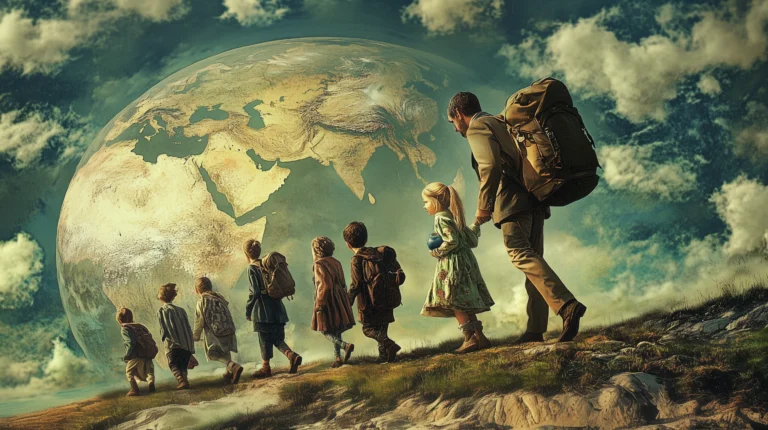Three Days of Work, Four Days to Live
“No longer referring the boons of his reign to their transcendent source, the emperor breaks the stereotypic vision which it is his role to sustain. He is no longer the mediator between the two worlds. Man’s perspective flattens to include only the human term of the equation, and the experience of a supernal power immediately fails. The upholding idea of the community is lost. Force is all that binds it. The emperor becomes the tyrant ogre (Herod-Nimrod), the usurper from whom the world is now to be saved.”
― Joseph Campbell, The Hero with a Thousand Faces
Imagine a world where machines lift our burdens and profits skyrocket, yet millions are shown the door. That world is here. From California to Berlin, giant companies claim “Artificial Intelligence” made them cut jobs, even while their cash piles grow, their share prices surge, and their chiefs collect fortunes most of us cannot picture. Greed and clever word games are gutting the very people whose work built those empires.
Look closer and you see the same polished faces at elite schools, on the boards of banks, and in quiet members‑only clubs. Politicians and executives share classrooms, donors, and dinner tables. Their first loyalty is to one another, not to the public. So the layoff wave rolls on, softened by polite speeches and taxpayer gifts, while ordinary families lose wages, time, and hope.
Revolutions came and went—French, Russian, digital—and each promised a fairer deal before power slid back into familiar hands. More blood or broken windows will not fix a system wired for the few. What can? Knowledge, when lived, turns into wisdom. When citizens recognise exactly how a friendly CEO turns tyrant, or how a smiling minister signs away our future, they can refuse the story that “nothing can change.” This article lays out the facts in plain words: who profits, who pays, and how sharing both work and wealth could let every person live, create, and rest instead of fighting for scraps.
“All of humanity’s problems stem from man’s inability to sit quietly in a room alone.”
― Blaise Pascal, Pensées
Simple English summary of the findings
- From 2022 to 2025 many big companies in the United States and Europe cut tens of thousands of jobs while saying they were changing to Artificial Intelligence or other automation.
- Firms that did this include Amazon, Google, Microsoft, Meta, BT, IBM, Intel and John Deere.
- These companies stayed very profitable. They kept large cash reserves and spent billions buying back their own shares, which pushes up the stock price.
- Chief executives were paid extremely well. For example, Google’s boss earned about 226 million dollars in 2022, more than 800 times the pay of a typical worker, even after Google removed 12 000 jobs.
- Share prices often rose right after the job‑cut news because investors liked the lower costs.
- Many of the same firms also received public support. Intel, for instance, won more than 8 billion dollars in government grants and 11 billion in loans from the CHIPS Act while planning to dismiss about 15 000 staff. Local tax breaks and other subsidies are common too.
- The public therefore helps fund companies that still reduce their work‑forces.
- A different path is possible. One proposal is a three day work week with full pay, where each full‑time role is shared by two people. Each person works about 20 hours and keeps the same salary.
- Trials of shorter weeks, mostly four days, already show that output often stays the same or even improves, and workers report better health and more free time.
- A three day week could roughly double the number of jobs, lower stress and give people four free days for family, art, study and community life.
- Profitable companies could afford this if they redirected part of the money now used for buybacks and huge bonuses.
- Governments rarely demand job guarantees when they award subsidies, and they have not acted strongly to share the gains from automation. This feeds public anger and loss of trust.
- Surveys show most people believe big companies have too much power and the economy needs major change.
- If leaders keep letting profits rise while jobs fall, trust in both business and government will keep sinking and social tensions will grow.
- Technology can enrich only a few or it can free everyone by cutting working hours. Sharing work and wealth is possible right now if firms and governments choose it.
Dig deeper: see the attached PDF for the full research and detailed findings.
The saddest part is this: common people fight over pennies while the rich take everything. Poor immigrants get blamed. Neighbours turn on each other. One group hates another. All while the real enemy laughs from the top floor.
But the word enemy here isn’t a single person — it’s an idea. A cold, cruel framework built to serve profit over people. A system that teaches us to follow rules even when they harm human wellbeing. That mindset is the enemy.
And those who follow it blindly, who preach it, who defend it no matter the cost — they become its priests, its agents, its mouthpieces.
But who will raise their voice, when most are trapped living from paycheck to paycheck, just trying to feed their families? The silence is not weakness — it’s survival. Yet even in silence, the truth waits. And someone, somewhere, must speak.
Why? Because most people don’t see the truth. They don’t understand life’s misery, its beauty, or its unity. We are not separate tribes. We are one living organism. But the system has trained us to forget that.
Corporate power doesn’t need chains or guns anymore. It just needs to stir the pot—feed our envy, fuel our anger, deepen our confusion. It knows how to use our trauma, our old beliefs, our religious scars, and all the cracks in the mind. It divides us, and we fall for it every time.
So the answer isn’t rage. It’s clarity. See the game. Learn who you are. And never again let someone else use your pain against your own kind.







